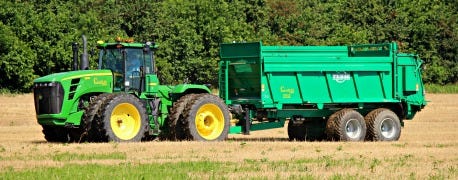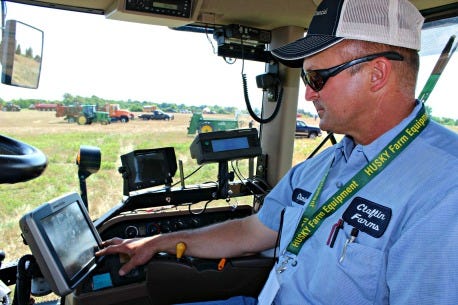
Crowds of farmers and custom applicators filled the newly cut wheat fields outside of Springfield to watch demonstrations of the latest in manure handling equipment. A local farmer was one of those in the line up to show how his solid manure spreader works with technology to improve coverage.
Charles Claflin climbed into his Tebbe Solid Manure Spreader during the North American Manure Expo held in July. The Vernon County farmer uses a manure spreader to apply poultry litter, cattle manure and lime to crop fields and pasture ground.

MORE MANURE: Charles Claflin demonstrates how his Tebbe Solid Manure Spreader can be used to apply cattle manure, poultry litter or lime during the recent North American Manure Expo in Springfield.
He purchased the spreader, which is capable of holding up to 31 cubic yards of solids. The machine uses a spinner beater to spread anywhere from 1/2 ton up to 40 tons per acre.
Over the years, manure spreaders have gotten larger with more versatility, but it is the technology that impresses Claflin. "We are able to apply manure to more acres at a more precise agronomic rate," Claflin says.
Improving technology
Claflin has his crop field, which are primarily made up of Parsons silt loam, soil tested regularly. He sends the cattle manure to a lab in Nebraska for nutrient analysis. Using this information, along with yield maps, he is able to create a plan for manure application.
Claflin's equipment is equipped for variable rate technology or VRT, which adjusts fertilizer application rate based on soil and yield maps. "I am able to see the low spots on our farm that may need more fertilizer," he says. "But I can hold back on the high spots."

IMPROVING ACCURACY: Relying on monitors in his tractor cab, Charles Claflin is able to monitor the application of manure across his fields. He says a scale monitor is an important tool in the cab, "You have to know how much manure you are spreading."
Using a John Deere 2630 monitor, he keeps track of each pass with the spreader. He says the change between rates appears seamless. "By the time it hits the line I see in the monitor, the rate has changed and the spreader is spreading," Claflin says. "We really have no skips."
Realizing results
Since incorporating VRT into his manure management practice just two years ago, Claflin is already seeing the results. "Our crops are more uniform," he says. "And they are producing more consistent yields across the field."
Owning his manure spreaders comes with its own advantages. No longer does his manure pile up at the farm waiting for a custom applicator. "I am able to spread year round, within the means of the law," Claflin says. Convenience, he says, adds value.
About the Author(s)
You May Also Like






